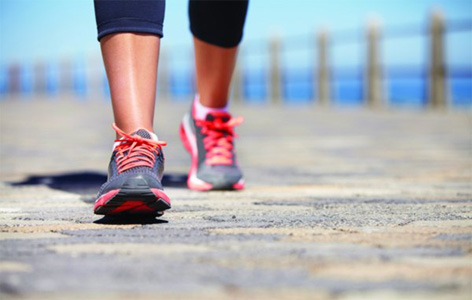Home page Description:
Exercise training reduces severity of sleep apnea in patients with coronary artery disease.
Posted On: June 10, 2016

Image Caption:
Exercise engages the musculovenous pump in the calves and reduces fluid retention in the legs.
While a person is sitting during the day, fluid accumulates in their legs. This happens because of gravity and because a pump in the calves that returns fluid to the rest of the body is not active.
Consequently, when a person lies down at night, this fluid is redistributed towards the neck and chest area also by gravity. This fluid shift contributes to two forms of sleep apnea during which breathing repeatedly stops and starts: obstructive sleep apnea (OSA) in which the fluid accumulates in the neck and increases pressure around the throat, reducing its size and increasing its collapsibility; and central sleep apnea (CSA) in which fluid accumulates in the lungs provoking instability of breathing. Both forms are associated with increased mortality in people with coronary artery disease or heart failure.
Exercise training has already been shown to reduce the severity of OSA and CSA, yet how this happens is not understood. A recent study led by TGHRI and TRI Senior Scientist Dr. T. Douglas Bradley sheds light on this phenomenon by studying how it affects fluid retention in the legs.
Dr. Bradley’s team examined the effects of a four week period of exercise training in coronary artery disease patients with OSA or CSA. The team found that the severity of sleep apnea was significantly decreased in patients who underwent exercise training compared to those who did not. This improvement was associated with reduced fluid accumulation in the legs during the daytime, less fluid shift out of the legs overnight and less accumulation of fluid around their neck than those who did not undergo exercise training.
“These findings suggest that reducing fluid shift overnight from the legs to the neck and lungs can reduce the severity of OSA and CSA, even without improving physical fitness or weight loss,” says Dr. Bradley. “Whether the reduction is related solely to fluid shift or to more chronic exercise training requires more study.”
This work was supported by the Canadian Institutes of Health Research.
Effects of exercise training on sleep apnoea in patients with coronary artery disease: a randomised trial. Mendelson M, Lyons OD, Yadollahi A, Inami T, Oh P, Bradley TD. European Respiratory Journal. doi: 10.1183/13993003.01897-2015. 2016 April 13. [Pubmed abstract]
Consequently, when a person lies down at night, this fluid is redistributed towards the neck and chest area also by gravity. This fluid shift contributes to two forms of sleep apnea during which breathing repeatedly stops and starts: obstructive sleep apnea (OSA) in which the fluid accumulates in the neck and increases pressure around the throat, reducing its size and increasing its collapsibility; and central sleep apnea (CSA) in which fluid accumulates in the lungs provoking instability of breathing. Both forms are associated with increased mortality in people with coronary artery disease or heart failure.
Exercise training has already been shown to reduce the severity of OSA and CSA, yet how this happens is not understood. A recent study led by TGHRI and TRI Senior Scientist Dr. T. Douglas Bradley sheds light on this phenomenon by studying how it affects fluid retention in the legs.
Dr. Bradley’s team examined the effects of a four week period of exercise training in coronary artery disease patients with OSA or CSA. The team found that the severity of sleep apnea was significantly decreased in patients who underwent exercise training compared to those who did not. This improvement was associated with reduced fluid accumulation in the legs during the daytime, less fluid shift out of the legs overnight and less accumulation of fluid around their neck than those who did not undergo exercise training.
“These findings suggest that reducing fluid shift overnight from the legs to the neck and lungs can reduce the severity of OSA and CSA, even without improving physical fitness or weight loss,” says Dr. Bradley. “Whether the reduction is related solely to fluid shift or to more chronic exercise training requires more study.”
This work was supported by the Canadian Institutes of Health Research.
Effects of exercise training on sleep apnoea in patients with coronary artery disease: a randomised trial. Mendelson M, Lyons OD, Yadollahi A, Inami T, Oh P, Bradley TD. European Respiratory Journal. doi: 10.1183/13993003.01897-2015. 2016 April 13. [Pubmed abstract]




